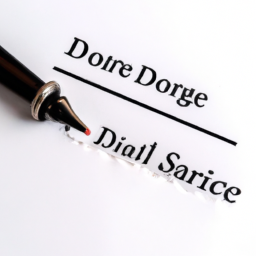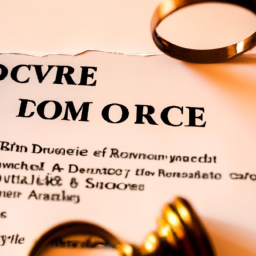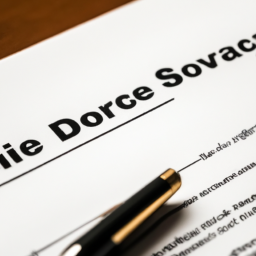Marriage is a sacred union between two individuals, bound by love, trust, and commitment. However, it is not uncommon for couples to face challenges and hardships that put their relationship on the brink of divorce. The decision to end a marriage can be emotionally draining and devastating for both partners involved. That is why it is crucial to explore every possible avenue to salvage the relationship and rebuild the foundation of love and understanding. In this blog post, we will delve into the depths of how to save a marriage from divorce. By addressing common issues, providing practical advice, and offering effective strategies, we aim to guide couples towards a path of reconciliation and rediscovery. If you find yourself in a tumultuous marriage, seeking ways to mend the fractures and reignite the flame, this article is here to offer support and guidance. Let us embark on this journey together and explore the transformative power of love and commitment in overcoming the challenges that threaten to dissolve a once unbreakable bond.
Effective Communication Strategies to Save Your Marriage from Divorce
Marriage is a beautiful union between two individuals, but it can also face challenges that put it at risk of ending in divorce. One of the most crucial aspects of a successful marriage is effective communication. When couples are unable to communicate effectively, misunderstandings, resentment, and conflicts can arise, leading to the deterioration of the relationship. In this article, we will explore some powerful communication strategies that can help save your marriage from divorce.
The Importance of Active Listening
Active listening is a fundamental skill that can significantly improve communication in any relationship, including marriage. It involves not only hearing the words spoken by your partner but also understanding their perspective, feelings, and needs. Here are a few key elements of active listening:
1. Give your full attention: When your partner is speaking, eliminate distractions and focus solely on what they are saying. Maintain eye contact and show genuine interest in their words.
2. Avoid interrupting: Allow your partner to express themselves fully without interrupting or interjecting your own thoughts. Interrupting can make your partner feel unheard and can escalate conflicts.
3. Reflect and clarify: After your partner finishes speaking, reflect on what they said and clarify any points that you didn’t fully understand. This shows that you value their perspective and are actively engaged in the conversation.
By practicing active listening, you create a safe space for open and honest communication, fostering a deeper understanding and connection with your spouse.
Expressing Emotions Constructively
Emotions play a significant role in marital conflicts, and how they are expressed can either escalate or resolve issues. It is crucial to express your emotions constructively to avoid damaging the relationship further. Here are some tips for expressing emotions effectively:
1. Use “I” statements: When discussing sensitive topics, use “I” statements instead of blaming your partner. For example, say “I feel hurt when…” instead of “You always make me feel hurt.”
2. Avoid criticism and defensiveness: Criticizing your partner or becoming defensive can lead to a breakdown in communication. Instead, focus on expressing your feelings and needs in a non-judgmental manner.
3. Take breaks when necessary: If emotions are running high and a productive conversation seems unlikely, it’s okay to take a break. Step away from the situation, calm yourself, and return to the discussion when you are both in a better state of mind.
By expressing your emotions constructively, you create an environment where both partners feel heard and understood, paving the way for conflict resolution and a stronger bond.
Developing Problem-Solving Skills
Marriage often involves facing various challenges and conflicts. Having effective problem-solving skills can help navigate these difficulties and prevent them from escalating into marital crises. Here are some steps to develop problem-solving skills:
1. Identify the problem: Clearly define the issue at hand, ensuring both partners have a shared understanding of the problem.
2. Brainstorm solutions: Encourage open and creative thinking to generate multiple potential solutions. Avoid criticizing or dismissing ideas during this stage.
3. Evaluate and choose a solution: Assess the pros and cons of each solution and jointly decide on the most suitable one. Compromise may be necessary to find a solution that satisfies both partners.
4. Implement and review: Put the chosen solution into action and evaluate its effectiveness over time. If needed, make adjustments or try alternative approaches.
By developing problem-solving skills, you and your partner can work together to find mutually beneficial solutions, fostering a sense of teamwork and unity within your marriage.
Effective communication is the cornerstone of a healthy and thriving marriage. By actively listening, expressing emotions constructively, and developing problem-solving skills, you can save your marriage from the brink of divorce. Remember, it takes time and effort from both partners to improve communication, but the rewards of a stronger and more fulfilling relationship are well worth it.

Building Trust and Rebuilding Your Relationship to Prevent Divorce
Welcome to this comprehensive guide on how to save your marriage from divorce by focusing on building trust and rebuilding your relationship. Divorce can be a painful and challenging experience, but with dedication and effort, it is possible to overcome the difficulties and create a stronger bond with your partner. In this article, we will explore effective strategies and steps that can help you rebuild trust and prevent divorce.
The Importance of Trust in a Marriage
Trust forms the foundation of any successful marriage. It is the belief that you can rely on your partner, that they have your best interests at heart, and that they will be honest and faithful. When trust is broken, it can lead to a breakdown in communication, emotional distance, and ultimately, divorce. Therefore, rebuilding trust is crucial to saving your marriage.
Rebuilding trust requires time, patience, and commitment from both partners. It is a process that involves open and honest communication, understanding, and forgiveness. Here are some steps you can take to rebuild trust and prevent divorce:
1. Acknowledge the Trust Issues
The first step towards rebuilding trust is acknowledging the issues that have caused the breakdown. It is essential to have an open and honest conversation with your partner about the trust issues you both are facing. This conversation should be approached with empathy and understanding, without blaming or criticizing each other. By acknowledging the problems, you can start working together towards finding solutions.
2. Communicate Openly and Honestly
Effective communication is vital in rebuilding trust. Both partners need to be willing to express their thoughts, feelings, and concerns openly and honestly. This includes being transparent about past mistakes and making a commitment to change. Listening attentively to your partner’s perspective is equally important. Through open and honest communication, you can begin to rebuild the emotional connection and establish a stronger foundation for trust.
3. Seek Professional Help
Seeking professional help can be immensely beneficial in rebuilding trust and preventing divorce. Marriage counselors or therapists are trained to guide couples through challenging times and provide valuable insights and strategies. A professional can help you both navigate through your issues, identify underlying problems, and develop effective communication and trust-building techniques. Don’t hesitate to reach out for professional assistance if needed.
4. Practice Forgiveness
Forgiveness is a crucial aspect of rebuilding trust. It involves letting go of past hurts and resentments and allowing yourself and your partner to move forward. Forgiveness does not mean forgetting or condoning the actions that caused the trust issues, but rather choosing to release the negative emotions associated with them. It is a process that takes time and effort, but it is essential for healing and rebuilding your relationship.
5. Rebuild Intimacy and Emotional Connection
Intimacy and emotional connection are vital components of a healthy marriage. Rebuilding these aspects can help strengthen the bond between you and your partner. Engage in activities that you both enjoy and create opportunities for quality time together. Show appreciation for each other and express love and affection. By prioritizing intimacy and emotional connection, you can rebuild trust and prevent divorce.
6. Set Boundaries and Establish Trustworthy Behavior
Setting clear boundaries and expectations can help rebuild trust. Discuss with your partner what is acceptable and what is not in your relationship. Establishing boundaries can provide a sense of security and prevent future trust issues. Additionally, both partners must demonstrate trustworthy behavior consistently. Honesty, reliability, and accountability are essential for rebuilding trust and preventing divorce.
7. Be Patient and Persistent
Rebuilding trust is not an overnight process. It requires patience, persistence, and consistent effort from both partners. There may be setbacks along the way, but it is crucial to stay committed to the process. Celebrate small victories and acknowledge the progress you are making together. With time and dedication, you can rebuild trust and create a stronger, more resilient marriage.
In conclusion, rebuilding trust and preventing divorce requires a combination of open communication, forgiveness, professional help, and a commitment to change. By following these steps and implementing them into your relationship, you can rebuild trust and create a solid foundation for a lasting and fulfilling marriage. Remember, saving a marriage takes effort from both partners, so approach this journey with empathy, understanding, and a genuine desire to rebuild and strengthen your relationship.

Recognizing and Addressing Common Marriage Issues to Avoid Divorce
Marriage is a beautiful union between two individuals, but it can also face challenges that may lead to divorce. However, by recognizing and addressing common marriage issues, couples can take proactive steps to save their marriage and avoid the devastating effects of divorce. In this article, we will explore three key areas that often cause marital problems and provide practical advice on how to overcome them.
1. Communication Breakdown
Effective communication is the foundation of a healthy marriage. However, many couples struggle with communication breakdown, leading to misunderstandings, resentment, and ultimately, divorce. To save your marriage, it is crucial to address this issue head-on.
Firstly, both partners must commit to active listening. This means giving your full attention to your spouse when they are speaking, without interrupting or formulating a response in your mind. By truly hearing each other’s thoughts and feelings, you can foster a deeper understanding and strengthen your connection.
Secondly, open and honest communication is essential. Create a safe space where both partners feel comfortable expressing their thoughts and emotions without fear of judgment or criticism. Practice using “I” statements instead of blaming or accusing each other. For example, say “I feel hurt when…” rather than “You always make me feel…”. This approach promotes empathy and encourages constructive dialogue.
Lastly, consider seeking professional help through couples therapy. A trained therapist can facilitate productive conversations, provide valuable insights, and teach effective communication techniques. Therapy can be a transformative experience, helping couples rediscover their love and rebuild their relationship.
2. Lack of Intimacy
Intimacy is not just about physical affection; it encompasses emotional, intellectual, and spiritual connection as well. When a marriage lacks intimacy, it can lead to feelings of loneliness, detachment, and eventually, divorce. Rekindling intimacy requires effort from both partners.
Start by prioritizing quality time together. Set aside dedicated moments for meaningful conversations, shared activities, and simple gestures of affection. Engage in activities that you both enjoy, such as cooking together, going for walks, or pursuing a hobby as a couple. These shared experiences can reignite the spark and strengthen your bond.
Furthermore, explore ways to nurture emotional intimacy. Express appreciation for each other regularly and show genuine interest in your partner’s life. Share your dreams, fears, and aspirations, allowing vulnerability to deepen your connection. Remember, intimacy is built on trust and mutual respect.
If physical intimacy has dwindled, approach the topic with sensitivity and understanding. Discuss your desires, concerns, and any underlying issues that may be affecting your sex life. Seek professional guidance if necessary, as sexual difficulties can often be resolved with the help of a therapist or counselor specializing in couples’ intimacy.
3. Financial Strain
Financial strain is a common cause of marital discord. Money-related conflicts can create significant stress and strain the relationship. However, by adopting a proactive approach to financial management, couples can navigate this challenge together and safeguard their marriage.
Start by having an open and honest conversation about your financial situation. Discuss your individual beliefs, values, and goals regarding money. Develop a shared understanding of your financial priorities and create a budget that aligns with your mutual aspirations.
Transparency is key when it comes to finances. Maintain open lines of communication about income, expenses, and any debts or financial obligations. Consider setting up regular check-ins to review your financial progress and make necessary adjustments.
Additionally, explore ways to reduce financial stress. This may involve seeking professional advice on debt management, creating an emergency fund, or exploring new income streams. Remember, financial challenges can be overcome when faced together as a team.
In conclusion, saving a marriage from divorce requires proactive effort, patience, and a willingness to address common issues head-on. By improving communication, nurturing intimacy, and managing financial strain, couples can strengthen their bond, reignite their love, and build a future together. Remember, seeking professional guidance is never a sign of weakness but rather a testament to your commitment to saving your marriage.

Seeking Professional Help: Marriage Counseling and Therapy as a Solution to Divorce
Introduction
Marriage is a beautiful bond between two individuals, but sometimes it can face challenges that put it at risk of ending in divorce. When couples find themselves struggling to resolve conflicts and maintain a healthy relationship, seeking professional help through marriage counseling and therapy can be a valuable solution. In this article, we will explore the benefits of seeking professional help and provide you with a step-by-step guide on how to save your marriage from divorce.
The Importance of Professional Help
Marriage counseling and therapy can be a crucial step towards saving a marriage. These professionals possess the expertise and knowledge to guide couples through their difficulties and provide them with the necessary tools to rebuild their relationship. Here are some reasons why seeking professional help is essential:
1. Objective Perspective
Marriage counselors and therapists are impartial observers who can provide an objective perspective on the issues that couples face. They can identify patterns of behavior, communication problems, and underlying issues that may be contributing to the marital problems. This outside perspective can help couples gain insight into their relationship and work towards resolving conflicts.
Additionally, professionals can help couples navigate through emotional turmoil and encourage open and honest communication. They create a safe space where both partners can express their feelings without fear of judgment or criticism.
2. Effective Communication Techniques
Communication breakdown is often a significant factor in marital issues. Marriage counselors and therapists are skilled in teaching effective communication techniques that can improve understanding and resolve conflicts. They can help couples learn active listening skills, assertiveness, and empathy, enabling them to express their needs and concerns in a healthy and constructive manner.
By improving communication, couples can prevent misunderstandings, reduce tension, and create a more supportive and loving environment within their marriage.
3. Identifying and Addressing Underlying Issues
Marital problems are often symptoms of deeper underlying issues. Professional help allows couples to delve into these issues and understand the root causes of their conflicts. Whether it’s unresolved past traumas, differing values, or unmet emotional needs, marriage counselors and therapists can help couples identify these underlying issues and work towards resolving them.
By addressing these core problems, couples can create a solid foundation for their relationship and prevent recurring conflicts in the future.
Step-by-Step Guide to Saving Your Marriage
Now that we understand the importance of seeking professional help, let’s explore a step-by-step guide to saving your marriage from divorce:
Step 1: Acknowledge the Problems
The first step towards saving your marriage is acknowledging that there are problems that need to be addressed. Denying or ignoring the issues will only lead to further deterioration of the relationship. Both partners should openly acknowledge their concerns and commit to working on them together.
It is crucial to approach this step with empathy and understanding, as blaming each other will only create more conflict. Remember, the goal is to find solutions, not to assign blame.
Step 2: Research and Select a Professional
When seeking professional help, it is essential to research and select a marriage counselor or therapist who suits your needs. Look for professionals who specialize in couples therapy and have experience dealing with the specific issues you are facing.
Consider factors such as their qualifications, reputation, and approach to therapy. It is also crucial to find a professional with whom both partners feel comfortable and can establish a trusting relationship.
Step 3: Attend Marriage Counseling Sessions
Once you have selected a professional, it’s time to attend marriage counseling sessions. These sessions provide a safe and supportive environment for couples to express their concerns, improve communication, and work towards resolving conflicts.
Be open and honest during these sessions, as it is the key to finding effective solutions. Actively participate in exercises and assignments provided by the counselor, as they are designed to promote understanding and growth within the relationship.
Step 4: Implement Techniques and Strategies
Throughout the counseling process, the marriage counselor or therapist will introduce various techniques and strategies to help you overcome your marital challenges. It is crucial to implement these techniques in your daily life and practice them consistently.
Whether it’s improving communication, setting boundaries, or enhancing intimacy, these techniques are designed to strengthen your relationship and prevent further conflicts. Remember, change takes time, so be patient and committed to the process.
Step 5: Continual Growth and Maintenance
Saving a marriage is not a one-time fix; it requires continual growth and maintenance. Even after completing marriage counseling, it is essential to keep working on your relationship and implementing the skills and strategies learned.
Regularly check in with each other, communicate openly, and address any emerging issues promptly. Consider attending periodic counseling sessions as a way to maintain a healthy and thriving marriage.
Conclusion
When faced with the possibility of divorce, seeking professional help through marriage counseling and therapy can be a transformative solution. By providing an objective perspective, teaching effective communication techniques, and addressing underlying issues, marriage counselors and therapists can guide couples towards rebuilding their relationship.
Remember, saving a marriage requires commitment, effort, and a willingness to change. By following the step-by-step guide outlined in this article, you can take the necessary steps to save your marriage and create a loving and fulfilling partnership that stands the test of time.

Nurturing Emotional Intimacy and Connection to Save Your Marriage from Divorce
Marriage is a beautiful journey that requires effort, commitment, and continuous nurturing. However, sometimes couples find themselves facing the possibility of divorce due to a lack of emotional intimacy and connection. If you’re currently going through such a challenging phase in your marriage, don’t lose hope just yet. By following these steps, you can work towards saving your marriage from divorce and rebuilding the emotional bond that brought you together in the first place.
1. Open Communication
Effective and open communication is the foundation of any successful marriage. To save your marriage from divorce, it’s crucial to create a safe and non-judgmental space where both partners can express their feelings, needs, and concerns. Make a conscious effort to actively listen to your spouse without interrupting or criticizing. Validate their emotions and show empathy. By fostering open communication, you can begin to understand each other better and find solutions to the issues that have been causing emotional distance.
Furthermore, it’s essential to communicate your own needs and desires clearly. Don’t assume that your partner knows what you want; instead, express yourself honestly and respectfully. By doing so, you can avoid misunderstandings and work together towards rebuilding emotional intimacy.
Remember, effective communication is a two-way street. Encourage your partner to share their thoughts and actively engage in conversations that promote understanding and connection.
In our fast-paced lives, it’s easy for couples to drift apart and lose the sense of togetherness. To save your marriage from divorce, prioritize spending quality time together. Dedicate specific moments in your schedule for shared activities and create opportunities to bond with each other.
Engaging in activities that you both enjoy can reignite the spark and create new shared memories. It could be as simple as cooking together, going for walks, or pursuing a hobby as a couple. The key is to find activities that allow you to connect on an emotional level and remind yourselves of the joy you once experienced together.
Additionally, be mindful of the quality of time you spend together. Put away distractions such as phones or work-related matters and focus solely on each other. Show genuine interest in your partner’s life and actively participate in conversations. By doing so, you can strengthen the emotional bond and nurture the connection necessary to save your marriage.
3. Seek Professional Help
When facing marital challenges, seeking professional help can be immensely beneficial. Marriage counselors or therapists are trained to provide guidance and support to couples in distress. Don’t hesitate to reach out to a professional who can help you navigate through the complexities of your relationship.
A therapist can assist you in identifying the underlying issues contributing to the emotional distance in your marriage. They can provide you with tools and strategies to improve communication, resolve conflicts, and rebuild trust. With their expertise, you and your spouse can work together towards healing and strengthening your emotional connection.
Remember, seeking professional help is not a sign of weakness but rather a proactive step towards saving your marriage. It shows your commitment to finding solutions and creating a healthier, happier future together.
In conclusion, saving a marriage from divorce requires effort, dedication, and a willingness to address the emotional intimacy and connection that may have been lost along the way. By fostering open communication, dedicating quality time to one another, and seeking professional help when needed, you can rebuild your emotional bond and rediscover the love that brought you together. Remember, it’s never too late to work towards a happier and more fulfilling marriage.
Key Takeaways
Marriage is a sacred union that requires constant effort, understanding, and compromise from both partners. However, in today’s fast-paced and demanding world, many couples find themselves on the brink of divorce. It is crucial to recognize the signs and take proactive steps to save a marriage from falling apart.
Firstly, open and honest communication is the cornerstone of any successful relationship. Couples must create a safe space where they can express their feelings, concerns, and needs without fear of judgment. Active listening and empathy are equally important, as they foster understanding and help resolve conflicts. Additionally, seeking professional help through couples therapy can provide valuable guidance and tools to navigate through challenging times. This impartial third party can help identify underlying issues, teach effective communication techniques, and guide couples towards rebuilding trust and intimacy. Ultimately, saving a marriage requires dedication, patience, and a willingness to work through problems together, ensuring that the bond between partners grows stronger rather than weaker.
Your Burning Questions Answered:
Q1: How can I save my marriage from ending in divorce?
A1: Saving a marriage from divorce requires open communication, commitment, and willingness from both partners to work on the relationship. It is essential to seek professional help, such as marriage counseling, to address underlying issues and learn effective strategies for resolving conflicts.
Q2: What are some common signs that my marriage is in trouble?
A2: Common signs that a marriage may be in trouble include lack of communication, constant arguments, loss of intimacy, emotional detachment, infidelity, and a general feeling of dissatisfaction or unhappiness in the relationship.
Q3: Can marriage counseling really help save a troubled marriage?
A3: Yes, marriage counseling can be highly effective in saving troubled marriages. A skilled therapist can provide a neutral and supportive environment to help couples identify and address the root causes of their problems. They can also teach valuable communication and conflict resolution skills.
Q4: Is it possible to save a marriage if only one partner is willing to work on it?
A4: While it is ideal for both partners to be committed to saving the marriage, it is still possible to make progress if only one partner is willing to put in the effort. By seeking individual therapy and focusing on personal growth, the willing partner can influence the dynamics of the relationship and potentially inspire change in the other partner.
Q5: How important is communication in saving a marriage?
A5: Communication is vital in saving a marriage. Healthy and effective communication allows couples to express their needs, concerns, and emotions in a respectful manner. It helps build understanding, resolve conflicts, and foster emotional intimacy, which are all crucial for a lasting and fulfilling relationship.
Q6: Are there any self-help resources that can assist in saving a marriage?
A6: Yes, there are numerous self-help resources available, such as books, online courses, and articles, that can provide guidance and strategies for saving a marriage. However, it is important to remember that every relationship is unique, and seeking professional help is often recommended for personalized support.
Q7: How can I rebuild trust after infidelity and save my marriage?
A7: Rebuilding trust after infidelity is a challenging but possible journey. It requires the unfaithful partner to take responsibility, show genuine remorse, and be transparent about their actions. The betrayed partner needs time to heal and express their emotions. Professional help is crucial to navigate this process successfully.
Q8: Is it normal to go through ups and downs in a marriage?
A8: Yes, it is normal for marriages to experience ups and downs. Relationships are not always smooth sailing, and challenges are an opportunity for growth. However, if the downs outweigh the ups, and the relationship becomes consistently unhappy or toxic, it is important to address the issues and seek help.
Q9: How can I prevent my marriage from becoming stagnant or boring?
A9: To prevent a marriage from becoming stagnant, it is essential to prioritize quality time together, maintain open communication, and continuously work on keeping the spark alive. Engaging in new activities, exploring shared interests, and regularly expressing love and appreciation can help keep the relationship vibrant and exciting.
Q10: What if my partner and I have different goals or values?
A10: Having different goals or values does not necessarily mean the end of a marriage. It is important to have open and honest discussions about these differences, seeking compromise and understanding. If the differences are too significant and compromise seems impossible, professional guidance can help navigate the situation and determine the best path forward.

About Sarah:
Sarah is a certified marriage counselor and co-founder of SaveOurVows.com. Her expertise lies in helping couples reignite the spark in their relationships and create a lasting bond built on trust and understanding. As a devoted wife and mother, Sarah draws from her personal experiences and professional training to offer valuable guidance to couples seeking to save their marriages. Her articles focus on nurturing emotional connection and fostering a supportive environment where love can thrive.
About John:
John is a relationship expert and co-founder of SaveOurVows.com. With a Master’s degree in Marriage and Family Therapy, John is passionate about helping couples navigate the challenges that come with marriage. Having experienced the highs and lows in his own relationship with Sarah, he understands the complexities of married life and believes in the power of effective communication and emotional intimacy. John’s articles offer practical tips and insights to empower couples in their journey to a stronger and more fulfilling marriage.
Together as a Team:
John and Sarah’s mission is to provide a compassionate and supportive platform for couples in need of guidance and encouragement. Through their collaborative efforts, they aim to inspire love and commitment in marriages worldwide. As a couple themselves, they embody the principles they teach, and their dedication to helping others strengthen their relationships is the driving force behind SaveOurVows.com.
Favorite Topics:
Rekindling Romance: John and Sarah believe that rekindling the romance is an essential aspect of any successful marriage. Their articles on this topic offer creative ideas and practical strategies to keep the passion alive.
Effective Communication: Communication is the foundation of a healthy relationship. John and Sarah share expert tips to improve communication between couples and resolve conflicts constructively.
Building Trust: Trust is paramount in any marriage. Through their articles, they help couples rebuild trust and create a secure and loving environment.
Join Sarah and John’s Journey:
Sarah and John invite you to join them on their journey of empowering couples to save their vows and build lasting and fulfilling marriages. Their insights and advice aim to make a positive impact on your relationship, fostering a bond that stands the test of time.






